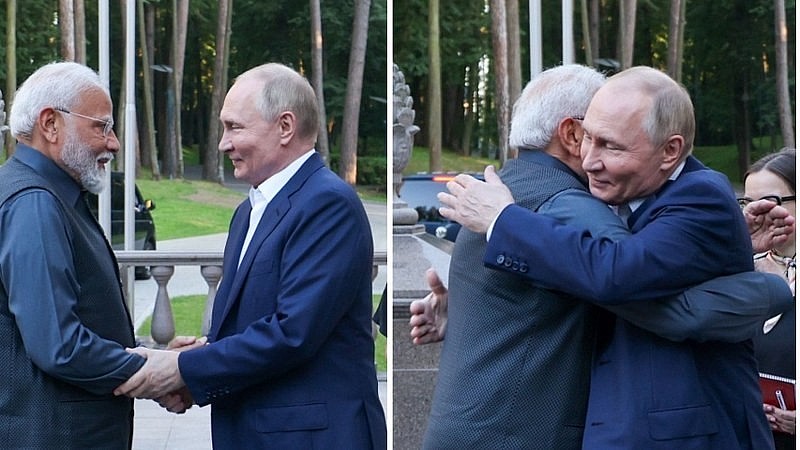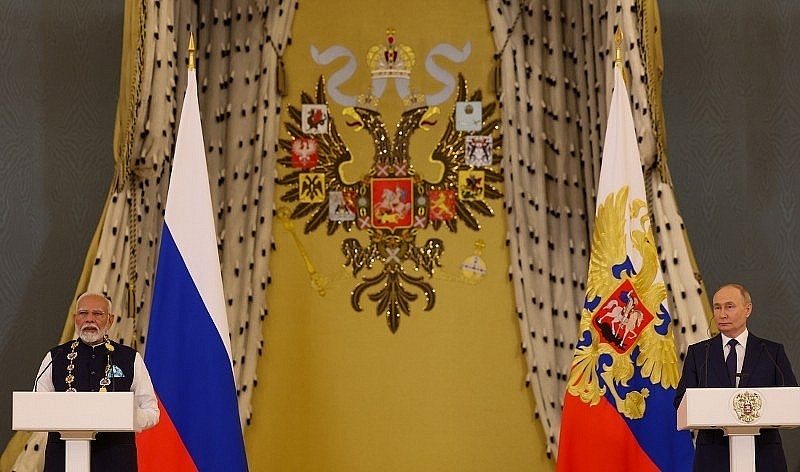 |
The warm embrace between Narendra Modi and Vladimir Putin, complete with a tour of the Russian President’s residence and their iconic bear hug, symbolized the enduring bond between India and Russia. This relationship, often termed a “special and privileged strategic partnership,” has its foundations in the Cold War when the Soviet Union was India’s key ally and arms provider.
What makes this partnership remarkable is its resilience through significant global shifts, including the dissolution of the Soviet Union and India’s growing alignment with Western nations.
At the heart of this enduring alliance is a multifaceted collaboration spanning defense, energy, technology, and geopolitical strategy. Russia remains a critical supplier of military hardware for India, which holds the title of the world’s largest importer of weapons.
A recent announcement by Rostec, the Russian state-owned arms company, to produce armor-piercing tank rounds in India, showcases the depth and evolving nature of their defense cooperation. This collaboration not only ensures India’s military readiness but also aligns with its “Make in India” initiative, boosting domestic defense manufacturing.
In the energy sector, India has significantly increased its imports of Russian crude oil, with figures soaring from $2.5 billion in 2021 to a staggering $46.5 billion in 2023, despite Western sanctions on Russia. This highlights India’s pragmatic approach to securing energy resources, especially as a rapidly growing economy with rising energy demands.
 |
Technological collaboration between the two nations continues to flourish, especially in nuclear energy and space technology. Rosatom, Russia’s State Atomic Energy Corporation, is in talks to construct six new nuclear power reactors in India, addressing India’s growing energy needs and showcasing the mutual trust and long-term vision of both countries.
Geopolitically, the India-Russia relationship serves as a strategic counterbalance in a complex world order. For India, strong ties with Russia counter China’s influence in the region, while Russia values its relationship with India to avoid over-dependence on China, especially with Western sanctions pushing Moscow closer to Beijing.
Modi’s recent visit to Moscow yielded significant developments, including an ambitious goal to increase annual trade to $100 billion by 2030. This target reflects a mutual desire to diversify and strengthen economic ties beyond traditional sectors.
Long-term agreements on oil and gas supplies were signed, ensuring energy security for India and providing Russia with a stable market amidst Western sanctions. These agreements are lifelines for Russia in the current economic climate.
The visit also saw an MoU signed between India’s National Centre for Polar and Ocean Research and Russia’s Arctic and Antarctic Research Institute, facilitating joint research in polar regions, an increasingly important area due to climate change and resource exploration.
To enhance people-to-people connections, Modi announced the opening of new Indian consulates in Kazan and Yekaterinburg, strengthening cultural ties and facilitating travel and business interactions. However, India’s deepening relationship with Russia has drawn concerns from Western nations, particularly the United States, given the ongoing conflict in Ukraine.
The timing of Modi’s visit, coinciding with a Russian missile strike on a children’s hospital in Kyiv, led to sharp criticism from Ukrainian President Volodymyr Zelensky. This incident highlights the delicate geopolitical tightrope India must walk as it navigates its strategic autonomy and foreign policy.
Despite growing ties with Western powers, India maintains its strategic autonomy by preserving its historically close relationship with Russia. This balancing act was evident in Modi’s indirect criticism of the hospital attack during his meeting with Putin, where he emphasized the need for dialogue to end the conflict.
The economic dimension of the India-Russia relationship has become increasingly prominent, with Russia emerging as India’s largest oil supplier, outpacing traditional Middle Eastern sources. This shift provides India with discounted energy supplies while offering Russia a significant market for its sanctioned oil exports.
However, challenges exist, and Indian officials have expressed concerns about the growing trade deficit with Russia, underscoring the need for a more balanced economic partnership. Modi’s request for the discharge of Indians serving in the Russian military demonstrates India’s efforts to address domestic sensitivities while maintaining cordial relations with Russia.
As India rises as a global power, its ability to navigate complex relationships will determine its international influence and strategic autonomy. The key challenge for India is to balance its ties with Russia against its growing relationship with the West.
With rising geopolitical tensions, India’s strategic autonomy and its ability to maintain constructive relationships with seemingly opposing camps will be tested. The India-Russia partnership, as demonstrated by Modi’s visit, remains robust and multifaceted, reflecting the intricate nature of 21st-century international relations.
This relationship, built on historical ties, strategic convergence, and mutual economic benefits, is likely to remain a cornerstone of India’s foreign policy. As both nations navigate a complex global landscape, their ability to adapt and strengthen their partnership will be crucial in shaping the geopolitical future.
The resilience of this relationship, despite changing global dynamics, underscores its strategic importance to both countries. The India-Russia partnership is a unique example of international collaboration, showcasing how nations can maintain strong bilateral ties despite differing relationships with other global powers.
Global observers will be watching as India and Russia adapt their partnership to new realities while preserving its core strengths. This enduring alliance, rooted in history but focused on the future, will undoubtedly play a significant role in the geopolitical landscape for years to come.



